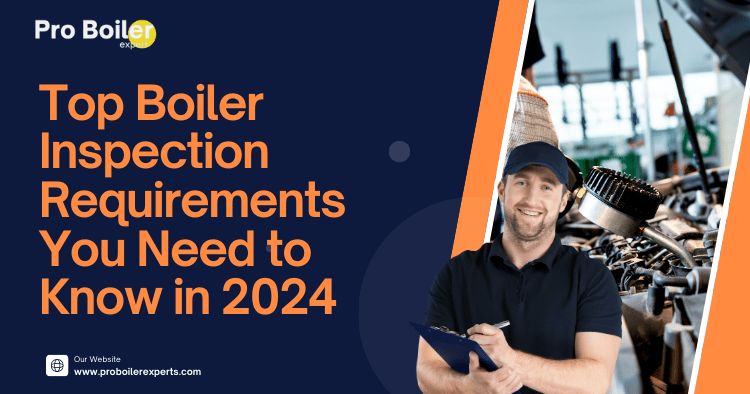Table of Contents
- 1. What is a Boiler Inspection?
- 2. Why Are Boiler Inspections Important?
- 3. Key Boiler Inspection Requirements for 2024
- 4. Frequency of Boiler Inspections
- 5. Types of Boiler Inspections
- 6. Who Can Perform Boiler Inspections?
- 7. Common FAQs About Boiler Inspections
- 8. Conclusion
1. What is a Boiler Inspection?
A boiler inspection is a thorough examination of a boiler system to ensure it is functioning safely and efficiently. This process involves checking various components, including the boiler body, pressure vessels, safety valves, and control systems. Inspections can help identify potential issues before they escalate into serious safety hazards.
Regular inspections can save lives and prevent costly repairs down the line. Don’t overlook this vital maintenance step!
2. Why Are Boiler Inspections Important?
Boiler inspections are crucial for several reasons:
- Safety: Regular inspections help prevent accidents, such as explosions or leaks, by identifying faulty components or systems.
- Efficiency: An efficiently running boiler consumes less energy, which can lead to significant cost savings.
- Compliance: Many regions have regulations mandating regular inspections to ensure public safety. For more information about safety standards, consider reviewing top energy efficiency standards for boiler installations in 2024.
Staying compliant not only ensures safety but also protects your investment in boiler technology.
3. Key Boiler Inspection Requirements for 2024
As we move into 2024, certain key inspection requirements have been established. Below is a table summarizing the core requirements:
| Requirement | Description |
|---|---|
| Annual Inspections | Mandatory inspections for all commercial boilers. |
| Documentation | Complete records must be maintained and accessible. |
| Certified Inspectors | Inspections must be conducted by certified professionals. |
| Compliance with Local Codes | Must adhere to local and state regulations. |
| Safety Valve Tests | Annual testing of safety and relief valves is required. |
Make sure to keep detailed records of all inspections and repairs – this could save you from potential fines!
4. Frequency of Boiler Inspections
The frequency of boiler inspections depends on several factors, including the type of boiler, its use, and local regulations. Here are some general guidelines:
- Commercial Boilers: Typically require annual inspections.
- Industrial Boilers: May need more frequent inspections, often semi-annually or quarterly.
- Residential Boilers: Generally inspected every one to two years.
It’s essential to check with your local authorities to understand specific mandates in your area. For a deeper dive into boiler types, you can refer to our articles on top 5 benefits of choosing combi boilers and system boilers.
Remember: Regular inspections are not just a checkbox; they are an investment in your boiler’s longevity and performance.
5. Types of Boiler Inspections
There are several types of boiler inspections, each serving a unique purpose:
- Internal Inspection: Involves a detailed examination of the boiler’s internal components. This is usually done during a scheduled shutdown.
- External Inspection: Focuses on the external components and overall condition of the boiler.
- Operational Inspection: Ensures that the boiler operates efficiently and safely while in use.
Regular inspections ensure that all types of potential issues are identified and addressed promptly. If you’re considering a new boiler, understanding the various boiler types can help you make an informed choice.
Different inspections reveal different insights – knowing when and what to inspect can make all the difference!
6. Who Can Perform Boiler Inspections?
Boiler inspections must be carried out by qualified individuals. Typically, this means hiring a licensed boiler inspector or a qualified engineer with specific training in boiler systems. It’s crucial that your inspector has the appropriate credentials and experience to ensure a thorough and accurate inspection.
Your safety depends on the expertise of your inspector. Always verify credentials before scheduling an inspection.
7. Common FAQs About Boiler Inspections
Q1: How much does a boiler inspection cost?
The cost can vary widely based on the type of boiler and the inspector’s rates, but you can expect to pay anywhere from $200 to $1,000 for a comprehensive inspection.
Q2: What happens if my boiler fails an inspection?
If your boiler fails an inspection, the inspector will issue a report detailing the necessary repairs. You must address these issues before the boiler can be deemed safe for operation. This highlights the importance of choosing the right boiler installer, as outlined in our guide on top tips for choosing the right boiler installer.
Q3: How can I prepare for a boiler inspection?
You can prepare by ensuring the area around the boiler is accessible and gathering all relevant documentation, such as past inspection reports and maintenance records.
Q4: Are there any penalties for not having an inspection done?
Yes, failing to comply with inspection requirements can result in fines, legal penalties, and increased liability in case of an incident. It’s important to stay updated with local regulations, which you can find in our article on essential building regulations for boiler installations in 2024.
Preparation is key! A little effort in getting ready can lead to a smooth inspection process.
8. Conclusion
In summary, boiler inspections are a critical part of maintaining safety and efficiency in boiler operations. Understanding the requirements for 2024 will help you stay compliant and protect your investment. If you have any questions or need to schedule a boiler inspection, don’t hesitate to reach out to a certified professional.
For more detailed guidelines and updates on boiler regulations, visit the National Board of Boiler and Pressure Vessel Inspectors.
By staying informed and proactive about your boiler inspections, you can ensure a safer and more efficient operation for years to come! For further insights into boiler options, check out our article on top smart boilers revolutionizing home heating in 2024.




